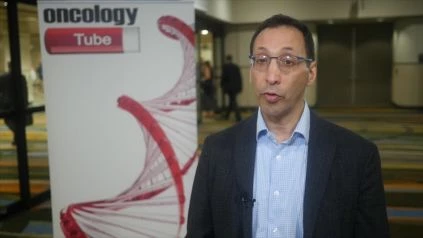Steven Horwitz, MD of @sloan_kettering discusses the phase 2 PRIMO study.
_______
Verastem, Inc. (Nasdaq:VSTM) (Verastem Oncology or the Company), a biopharmaceutical company focused on developing and commercializing medicines seeking to improve the survival and quality of life of cancer patients, today announced the presentation of key abstracts highlighting COPIKTRA® (duvelisib) data at the American Society of Hematology 2019 Annual Meeting taking place December 7-10, 2019, in Orlando.
Â
“Given the aggressive nature of peripheral T-cell lymphoma (PTCL) and the lack of effective therapeutic options for these patients, we are pleased to present data from the dose optimization phase of our PRIMO trial that demonstrated a 62% overall response rate (ORR), as assessed by independent central review, with a manageable safety profile consistent with previous clinical trials. The results of the trial also identified the optimal dosing regimen for future clinical study,†said Brian Stuglik, Chief Executive Officer of Verastem Oncology. “The expansion phase of this registration-directed study is well underway. Upon completion, we plan to build upon our existing Fast Track Designation and Orphan Drug Designation and submit a regulatory package to the U.S. FDA with the goal of broadening the use of COPIKTRA to include treatment of PTCL.â€Â
Â
Results from the Dose Optimization Portion of the Phase 2 PRIMO Study in Relapsed or Refractory PTCL
Â
The PRIMO study is a multi-center, open-label, registration-directed Phase 2 study evaluating duvelisib in patients with relapsed or refractory PTCL that is expected to enroll approximately 120 patients. In the dose optimization portion of the study, patients were randomized to receive duvelisib 25mg twice daily with an option for dose escalation (cohort 1) or duvelisib 75mg twice daily continuously (cohort 2) until disease progression or unacceptable toxicity. The primary endpoint of the study was investigator-assessed overall response rate (ORR), and secondary endpoints included duration of response (DOR) and safety.
Â
A total of 33 patients (cohort 1, n=20; cohort 2, n=13) were treated in the dose optimization phase. Investigator-assessed ORRs were 35% in cohort 1 and 54% in cohort 2, with a complete response (CR) rate of 25% and 31% in cohort 1 and cohort 2, respectively. ORR, as assessed by blinded independent central review was 40% in cohort 1 and 62% in cohort 2. Thirteen of 20 patients in cohort 1 and all patients in cohort 2 were able to complete one cycle of therapy. Seven patients in cohort 1 discontinued therapy early due to disease progression and/or toxicity. Most responses were observed at the end of cycle 1 (cycle=28 days). At a median follow-up of 21.4 weeks, the majority of responders were still in response at the time of their last assessment. The most common (≥4 patients) Grade ≥3 adverse events (AEs) in all patients receiving duvelisib were neutropenia, thrombocytopenia, diarrhea, rash/maculopapular, lymphocytopenia, pneumonia and sepsis. Serious AEs occurring in ≥2 patients were colitis, diarrhea, abdominal pain, pyrexia, sepsis, pneumonia, hyponatremia, rash/maculopapular, dyspnea, and respiratory failure.
Â
Based on these efficacy and safety data, the investigators have elected to investigate duvelisib starting at 75mg twice daily for two cycles, followed by 25mg twice daily, during the dose expansion portion of the study which is currently ongoing.Â
Â
“In the dose optimization portion of the PRIMO study we observed encouraging results, including complete and durable responses at both dose levels,†said Steven Horwitz, MD, Memorial Sloan Kettering Cancer Center, and principal investigator of Phase 2 PRIMO study. “We also identified a strategy for the expansion phase dosing regimen starting with 75mg twice daily for two cycles to achieve more a reliable initial tumor response, followed by 25mg twice daily to try to maintain longer-term disease control by mitigating the potential for later onset toxicity in these patients with relapsed or refractory disease.â€

